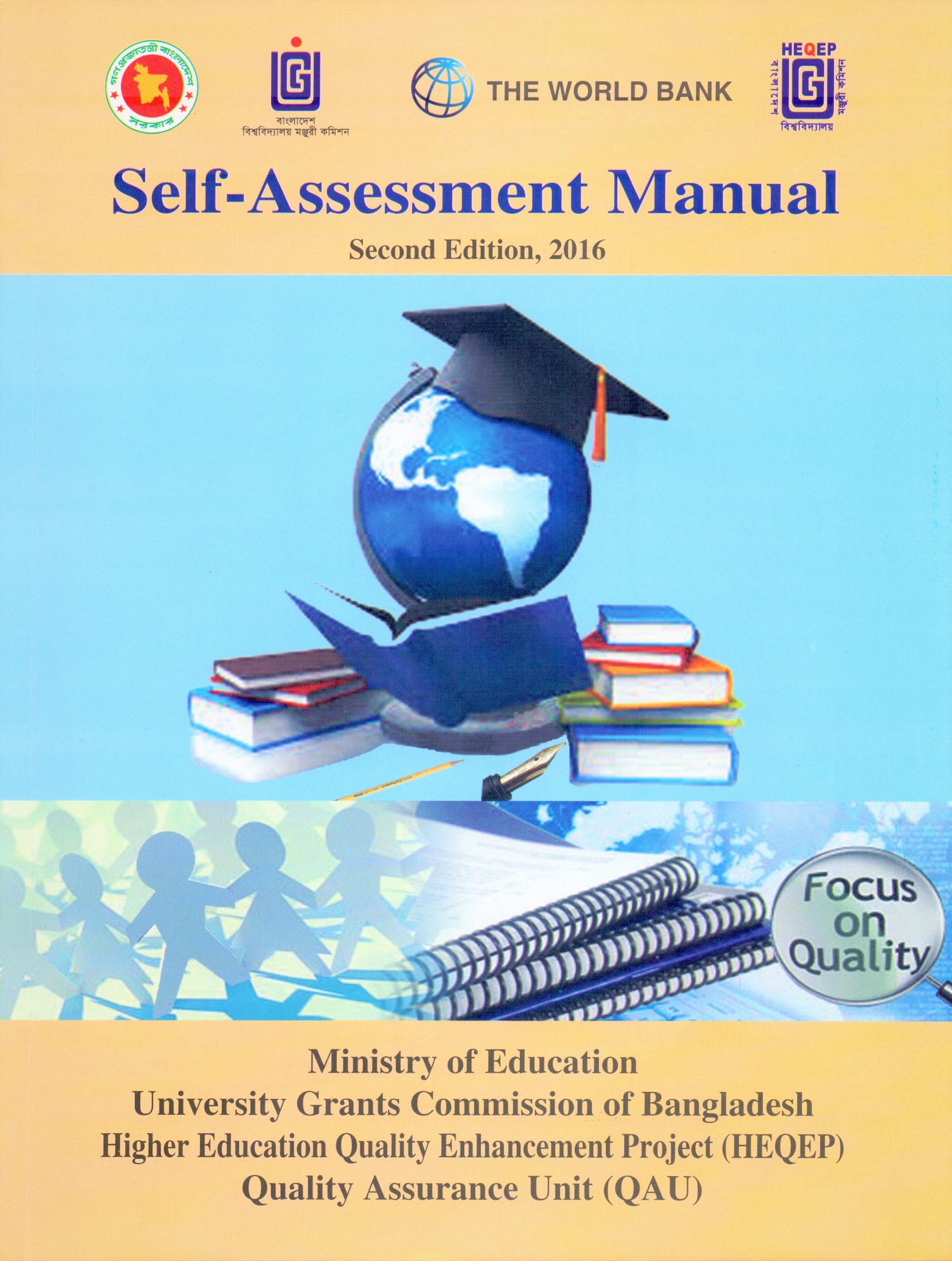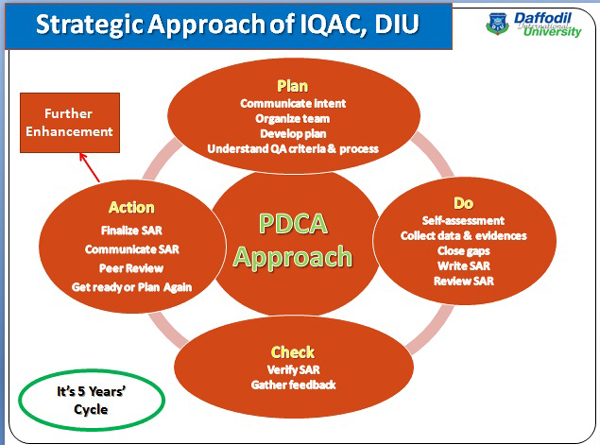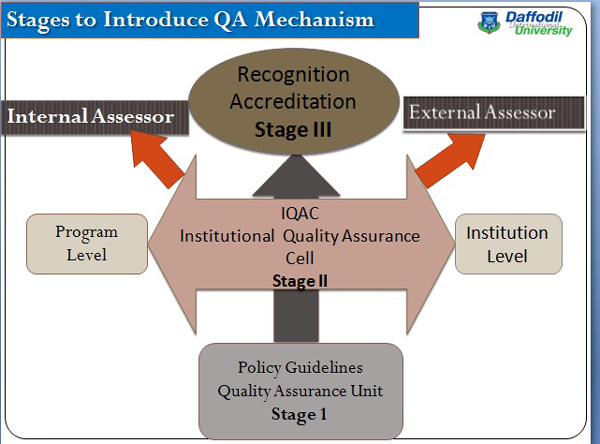Section outline
-
Objectives:
- To make the faculty members aware about the Quality Education in Tertiary Level of Education.
- To receive the in-depth analysis on IQAC as it plays the significant and viatal roles to ensure quality education at higher education.
- To know the Quality Assurance areas of IQAC as each departments work in an integrated way, on 9 QA areas, which cover all the development of any HEIs..
Outcomes:
After successful completion of the course, the faculty members will be able to
- know the details quality education tools and techniques
- interact and share their views for the improvement where Self Assessment Committee can bridge
- work independently in designing innovative teaching learning methods
- know the standard and global practice of quality education
-
Higher education in Bangladesh has experienced a phenomenal growth at least in quantity, doubling in number of tertiary level students. But the quality of education and research could not match the horizontal increase. There is a popular saying that quantity without quality is a sure prescription for disaster, while quality without quantity can act like seeds and at least something to build on. So quality is very important in higher education. Bangladesh is now working to change the landscape of higher education through enhancement of quality of higher education and research in the country...............
READ MORE....
Website of IQAC: https://iqac.daffodilvarsity.edu.bd/
-
-
Vision and Mission :
- IQAC’s Vision is to ensure excellence in quality assurance instruments in higher education and Industry-Institute Linkages.
- IQAC’s Mission is to coordinate, evaluate and compliance in Quality Assurance in teaching/learning, research and support services, consultancies aimed at achieving the goals of the University.
-
-

-
The sub-forum on 'Benefits of IQAC, DIU' invites the users to interact on different dimensions of the developments have been made after introducing the IQAC and QA practices.
-
-
-
- Governance
- Curriculum Content Design & Review
- Student Admission, Progress and Achievements
- Physical Facilities
- Teaching - Learning and Assessment
- Student Support Services
- Staff and Facilities
- Research and Extension
- Process Management & Continuous Improvement
Reference: Self-Assessment Manual (Second revised edition-2016)
-
The sub-forum will open the horizon of discussion on 9 QA Areas and SA departments.
-
-
-

-
IQAC considers 9 Quality Assurance (QA) areas to ensure quality education which are as: Governance; Curriculum Content Design & Review Physical Facilities; Teaching - Learning and Assessment; Student Support Services; Staff and Facilities; Research and Extension and Process Management & Continuous Improvement.
This sub-forum will address those QA areas in respect of quality assurance manuals (links attached).
-
-
International Workshop on "Need for change in the Course Curricula of Business School: Positioning and Competency of Business School in BIMSTEC Region” began at Daffodil International University
To develop education quality, research, regional cooperation and other important issues, a 2 day International Workshop on ‘Need for change in the course curricula of Business School: Positioning, Competency of Business School in BIMESTIC Region’ began today on June 3, 2016 at Daffodil International University Auditorium. Department of Business Administration and Institutional Quality Assurance Cell (IQAC) of Daffodil International University organized this international workshop
-
-
-
- Improved student performance and success in learning
- Improved work performance of academic and support staff
- Enhanced transparency and stakeholders confidence
- Enhanced capacity to compete with other higher learning institutions nationally, regionally and globally
-
-
General Compliance:
- Quality Content of teaching learning tools
- Ensuring capacity development for the faculty members (e.g. doing Ph.D, articles at high impact journal)
- Outcome Based Course Curriculum (OBCC) of global standard
- Proper academic audit
- Performance analysis and assessment tools
-
Establishment of quality assurance system in higher education is a global concern now. There is a growing demand for quality assurance (QA) mechanisms at national, regional and global levels. Over the years, it is observed that there is an increase in the number of HE institutions and increased involvement of external stakeholders through changes in governance structures.
-
The sub-forum invites to share the experiences of QA activities in international arena. The user will discuss on new and existing policies and principles, experiences, impact etc.
-
-
INDIA:
- Guidelines for the Creation of the Internal Quality Assurance Cell (IQAC) and Submission of Annual Quality Assurance Report (AQAR) by Accredited Institutions
- Institutional Accreditation- Revised Manual for Universities
- CURRICULAR ASPECTS
PAKISTAN
SRI LANKA- Institutional Review 2019: Frame Work based on the Higher Educational Review Process
- Program Review 2019
NEPAL
-
This sub-forum is pretty interesting as it will discuss and shares the best practices of quality assurance in higher education, focusing South Asian countries.
-
Activities of IQAC were published in national and international media, which can be retrieved from the below link:
-
Self Assessment Committee (SAC) is constituted to customize the survey tools proposed in the SA Manual for program self-assessment. The proposed survey tools are thoroughly discussed, reviewed, customized and finalized by by all the members of the sub-committee. The templates are essential for carrying out the self-assessment exercise in all programs of the Bangladesh’s universities. However, these are samples and very generalized. Program offering entities may customize these templates depending on their individual and specific requirements and context.
https://elearn.daffodilvarsity.edu.bd/pluginfile.php/703803/course/section/98845/newsandevents1.png
-
While SA departments conduct SA process, the departments face some challenges regarding survey domains. This sub-forum will ask and share those challenges at this board and IQAC secretariat will solve those problems or challenges.
-
-
The demand for Higher Education and the number of Higher Education Institutes has in recent times increased significantly in Bangladesh. Wider access to higher education has become necessary to address the diversifying demands of the local and global job market. Improving the quality of higher education is considered essential to this process. Improving the quality of higher education entails improving curriculum, faculty, physical resources, academic facilities, and research opportunities. The curriculum of Higher Education study should be outcome based, driven by the goal achievement of bridging the gap between Job market demand and supply of skilled Graduates passing out from the universities. To ensure the target objective, universities should adopt and practice outcome based education model.
READ MORE.... Outcome Based Education Curriculum
-
IQAC, UGC of Bangladesh and Bangladesh Accreditation Council have been working together to ensure the quality in the ecosystem.
The Bangladesh Accreditation Council was established under the Bangladesh Accreditation Council Act 2017. The law was approved by the Bangladesh Parliament in March 2016 and received the consent of the President. The appointment of the chairman and full-time members of the council was completed by June 2019.
Link of BAC ACT 2017: Bangladesh Accreditation Council Act 2017
-
Class Monitoring
To enhance the quality of teaching at Daffodil International University, the IQAC has taken an initiative to form a monitoring committee from each faculty of the university to monitor the teaching in classes and evaluate.
READ MORE.......
Question Monitoring Committee
Ensuring proper assessment of students learning is one of the key deliverable of quality assurance in Higher Education. Every university needs to establish a system to monitor the Question Papers regularly for assessing.
READ MORE.....
-
Class monitoring and Question Moderation are the vital for the capacity development in academic arena of the department. This sub-forum has been introduced to use the platform on these two domains.
-
-
The Course diary is a list of tasks that are supposed to be accomplished by students throughout the course. You can have a detailed understanding on course diary from the following document (link provided):
-
Bangladesh is a developing country and its economy is in transition from agriculture to industry, manufacturing and service sectors. Bangladesh intends to avail the opportunities offered by globalization to build a knowledge society. Improving the quality of its tertiary education is vitally necessary to spur the country to a higher growth trajectory for attaining the middle income status by 2020.
-
- Case Study
- Submission of Report (based on particular QA area(s))
- Empirical analysis and recommendations
-
Bangladesh has diverse education systems in this region. Privatization, widespread expansion, increased autonomy and introduction of Programmes in new and emerging areas have improved access to higher education. At the same time, it has also led to widespread concern on the quality and relevance of the higher education.
To address these concerns, Bangladesh government has initiated to introduce IQAC as a project which has been ended during 2018 and now the IQAC has became the integral part of each of the university in Bangladesh, as per directives of UGC of Bangladesh and has been working closely with Bangladesh Accreditation Council.
After ending the IQAC project (now it has became the integral part of DIU), visible outcomes in the area of Outcome Based Education (OBE) were recognized. Self Assessment departments of IQAC have built their capacity in 9 QA areas like designing outcome based course curriculum (OBCC), ensuring governance, adoption of innovative and effective teaching learning methodologies, student support service etc.
SA departments have been thriving to follow the guidelines and recommendations, made by the local and international peer reviewers. The External Peer Reviewer (EPR) Team has shared their knowledge and experiences which reflects in the improvement plan.
-
In this section, the user can share their experience on what they have learned so far, any recommendation for the improvement, facilitates any orientation to be applied for the practical exposure.




